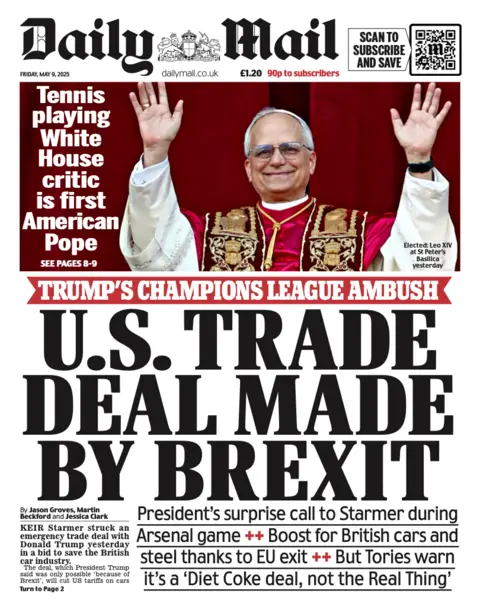The recent trade agreement between the United States and the United Kingdom has been widely attributed to the pressures and realities brought about by Brexit. The Daily Mail, a prominent British newspaper, highlighted this connection in their headline, declaring that the “U.S. trade deal made by Brexit” aims to support the British car industry, which has faced significant challenges due to American tariffs. This relationship underscores the broader implications of Brexit on Britain’s economic strategies and international trade relations, especially regarding its ambitions post-EU membership.
In contrast, the Financial Times reported on the same deal as a significant victory for UK Prime Minister Keir Starmer, stating that he had “sealed the first U.S. trade deal since the beginning of what was referred to as the Trump trade war.” The implications of this agreement have been analyzed in terms of the UK winning concessions in areas like car and steel exports, yet hampered by the persistence of a flat ten percent tariff on many goods. This nuanced view illustrates the complex realities of post-Brexit trade negotiations and the balancing act required to navigate them efficiently.
Further reflecting on this development, The Times echoed sentiments of a historic achievement from Starmer, highlighting that he touted the preservation of jobs in the UK. They also reported on how President Trump was negotiating better terms for U.S. agricultural products like beef and ethanol. While the UK gains ground in certain sectors, American interests still shape the contours of the agreement, illustrating the tension inherent in such negotiations.
The Daily Telegraph added another layer to the discourse with a claim that the agreement allows the U.S. to effectively “veto” Chinese investments in the UK, although such characterizations have been rebutted by government spokespeople as “categorically untrue.” This aspect of the deal raises questions about the geopolitical ramifications of the trade agreement, especially in the context of rising tensions between the U.S. and China.
Meanwhile, The I newspaper indicated that the UK has emerged favorably from a “global race to shake off the worst Trump trade tariffs,” pointing towards optimism regarding the pharmaceutical sector. Nonetheless, the uncertainty persists, as various industries grapple with the changing landscape of international trade.
The commentary across diverse publications was varied, with the Daily Star taking a cheeky approach by headlining “The future’s orange!” This humor likely referred to the enthusiasm surrounding the trade deal while juxtaposing it against a visually distinctive image of President Trump.
In a lighter vein, the Metro wrote “Holy smoke.. That was quick!” referring humorously to the rapid election of a new Pope, juxtaposed against the significant speed of the trade negotiations. The juxtaposition of these seemingly unrelated events highlights the swift pace of political change and public interest, illustrating the interconnected nature of global political happenings.
The Sun took a more reverent approach with their headline “God bless American,” celebrating the election of the first U.S. pope, while the Guardian underscored the new Pope’s commitment to building bridges and combatting “evil.” These reflections showcase a diverse media landscape engaged in the broader implications of international relations, whether through trade agreements or religious leadership.
The Daily Mirror, focusing on the 80th anniversary of Victory in Europe Day, presented a somber reminder of historical sacrifices, stating, “Honor their legacy,” which serves as a poignant reminder of the enduring impacts of history even amid contemporary political shifts.
As discussions around the UK-U.S. trade deal evolve, it becomes clear that this agreement is more than just a diplomatic win for the UK; it signifies the recalibration of international relations in the wake of Brexit, impacting various sectors and sectors, while shaping public opinion through robust media coverage.



